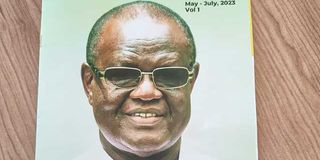Premium
After politics, Kiraitu now publishes happiness journal

Former Meru Governor Kiraitu Murungi. Mr Murungi, one of Kenya’s most intriguing politicians, poets and public intellectuals, is now the publisher of The Happiness Journal, a magazine about happiness.
Three years after he captured the nation’s imagination with a highly evocative essay on his near brush with death after he contracted Covid-19, and two after he published his acclaimed Beyond Politics, former Meru Governor Kiraitu Murungi has now launched a magazine.
Mr Murungi, one of Kenya’s most intriguing politicians, poets and public intellectuals, is now the publisher of The Happiness Journal (www.thehappiness-journal.com), a magazine about happiness.
Written in a simple diction, Mr Murungi begins his inaugural quarterly with a playful, conversational introduction.
“Are you happy? I am happy that you are reading this journal. I hope it will set you on a new journey in your life, a journey of self-discovery and happiness.”
He informs his readers that it is his journey, too. “For the last 40 years or so, I have led what by Kenyan standards is a successful life. As a top student, an advocate, a father, a Member of Parliament, a senator, a governor, and now chairman of a parastatal, God has been very kind to me,” he writes.
Yet Mr Murungi’s eventful life has been beset by setbacks such as losing his bid for a second term as Meru governor. He reveals this is indeed what set him on the journey to pursue happiness, registering with the US-based Happiness Studies Academy and now launching the Happiness Journal published by Happiness Resource Centre, where he is the Chief Happiness Officer.
Happiness Studies Academy was founded by Dr Tal Ben Shahar, a professor of positive psychology at Harvard, Mr Murungi’s old college. The Academy’s stated mission is to lead the happiness revolution “by educating leaders who are themselves dedicated to personal, interpersonal and communal flourishing.”
So seriously does Mr Murungi take his newfound mission that in November he will travel to Colombia for a happiness conference. The South American nation has in the past rated highly in the World Happiness Report which looks at people’s wellbeing beyond or away from the usual economic index race.
Drawing from the writings of David Hume who famously said the great end of all human industry is the attainment of happiness, Murungi writes that plots of land, flats and bank deposits will give one security, but true happiness comes from within the person and in community with fellow beings.
He describes the journal as a platform for learning, teaching and sharing ideas about happiness. He writes: “Although the scientific study of happiness emanates from the discipline of positive psychology, it cuts across the entire spectrum of human experience. It encompasses aspects of history, literature, sociology and biology.”

Former Meru Governor Kiraitu Murungi is now the publisher of The Happiness Journal, a magazine about happiness.
For a successful politician (he has lost an election only once in his 30-year political voyage), Mr Murungi has a rare penchant for acerbic imagery. Much of this poetry has landed him in hot water a few times, but he somehow emerges with minimal scalding.
Rape reference
As minister for Justice in the Kibaki administration, he was forced to apologise after making a comment about rape in reference to the suspension of international aid from lenders concerned about corruption.
He said donors penalising Kenya for something it was already tackling was “like raping a woman who is already willing.”
In his apology, picked up by international media, including the Los Angeles Times, Mr Murungi said that as the minister of justice and responsible for the promotion of human rights in Kenya, he would be the last person to glorify rape, which is a bestial violation of women’s rights.
In 2021, he warned, quite prophetically, that it would be a miracle if the Jubilee coalition, of which he was a key architect, retained power in the 2022 elections because it was clueless, rudderless, planless and disorganised.
He described the party of former President Kenyatta as a wild horse with no reins and one full of horror stories told at night behind closed doors. “Jubilee is in a terrible orgy of suicides, fratricides and infanticides,” he wrote in the bare-it-all-book, Beyond Politics: Conversations with Kiraitu Murungi.
He has also famously described politicians as swimmers in the currents of history who do anything to survive in a jungle of fast-changing terrains.
“(A politician) cannot afford to live in a world of absolutes. Sometimes he must act against his own conscience to avoid bad dogs or to appease voters. If he is torn between personal feelings and political necessity, political necessity always prevails. Political life has too many live wires. A politician has to tread carefully to avoid short circuits which can be deadly.”
Yet throughout his public life, Mr Murungi, now chairman of the National Oil Corporation of Kenya, has often found himself torn between the practicality of politics and idealism of an intellectual honed by the revolutionary literature of the likes of Franz Fanon, Che Guevara, Walter Rodney, Mao Tse-tung and Ngugi wa Thiong’o.
By exiting the “high drama of politics” after his “painful loss in the last election” and returning to law practice and intellectual pursuits, Mr Murungi has remained true to the Aristotelian concept of the philosopher king and pioneered a tradition, long established in the Western world, where senior leaders – including governors and Presidents – return to “ordinary life”, including teaching and writing, after leaving office.
Mr Murungi explains that Happiness Resource Centre, which publishes the journal, is a social impact company “whose primary objective is to facilitate the people of Kenya and elsewhere to pursue and enjoy happiness as the most important goal in life.”
The journal welcomes articles, letters, commentaries, reviews and adverts,
He says that although Happiness Resource Centre is registered as a company limited by shares, all the revenues generated by the company are reinvested and used to realise, optimise and expand its operations to “better realise the objectives of maximising happiness in our lives.”




